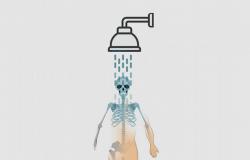
From Rome
The european elections that ended this Sunday after four days of voting in the 27 countries of the European Union (EU) show a consistent right advance according to the first projections prepared by the analysis company Europe Elects, which was based on exit polls in different countries. The final results will be known on Monday.
Europe Elects calculated that the Center-right European People’s Party (EPP), would qualify as the main party in the EU and could get 184-186 deputies in the European Parliament, eight-ten more than it had achieved in 2019. The Socialists and Democrats (S&D) would have 136, which means four less than in the previous elections and the liberals of Renew Europe 89, that is, less than 14 than before. The right-wing members of the Party of European Conservatives and Reformists, to which Italian Prime Minister Giorgia Meloni’s far-right party, Fratelli d’Italia, They would get 73 places, five more than before and Matteo Salvini’s right-wing League would get 67, eight more than before.
But the strongest blow was undoubtedly the result obtained in France where the far-right Rassemblement National party of Marine Le Penwould have obtained around 32.5% of the votes, more than double the votes of Renacimiento (15.2%), the president’s party Emmanuel Macron. After this, Macron called legislative elections for June 30 (first round) and July 7 (ballottage).
Italy
According to exit polls released at 11 p.m. local time, In Italy the Fratelli d’Italia (FdI) party is confirmed in first place, obtaining between 26-30% of votesfollowed by the Democratic Party (PD, center-left) with 21-25.9%, the Five Star Movement (M5S, center) with 10-14%, and Meloni’s other two allies in the government, Forza Italia ( FI, center-right) with 8.5-10.5% and the League (right) with 8-10%.
Meloni wanted to obtain at least 30% consensus in these elections. It is not yet known if he will succeed because the definitive data is not yet known. Obtaining 30% and qualifying as the most voted party in Italy would allow it to accelerate the State reform process that it is trying to carry out at the level of justice and especially at the level of the executive branch. Meloni wants the “premierato” to be approved, that is, for the prime minister to be elected directly by the voterss, which would give him much more power. Today the prime minister is appointed by the President of the Republic, generally an exponent of the majority party, and must be approved by Parliament.
In the 2019 European elections, the Italian party with the most votes was Mateo Salvini’s League, which obtained no less than 34.26 percent of the votes. Next in importance was the PD with 22.74% of the votes, and the M5S with just over 17%. Fratelli d’ Italia at that time obtained only 6.44% of the votes. All this changed in the political elections that were held in Italy 2022 where FdI qualified as the first party with 25.98% of the votes followed by the PD with 19.04 and M5S with 15.43%. The League dropped to 8.79%, very close to Forza Italia, the party founded by Silvio Berlusconi, which achieved 8.11%.
This weekend, Italy also voted to elect the mayor and Municipal Council of more than 3,600 cities. The result obtained in the region of Piemonte, whose capital is Turin, in northern Italy, could also be significant, where a new president and the region’s councilors were voted. The results of these Italian elections will be known this Monday.
Something curious happened this year in the European elections in Italy. When the person arrived to vote at the polling station that had been assigned to them, they were forced to leave their cell phone, that is, not to take it to the polling station where, with a pen in hand, they marked the party or the candidates chosen at the polling station. electoral ticket. Because? So that the votes cannot be sold, they explained at the table, because people can take a photo of the party or the candidates voted for and send it to the corrupt people who buy votes to get their election.
Spain
In Spain, always according to exit polls also known as exit polls, the Popular Party (PP, right) would have the most votes in the European elections with 34.2% of the votes, winning 22 deputies. While the PSOE (Spanish Socialist Party) currently in government, it would get 30.2% and 20 MEPs out of a total of 61. The far-right Vox would get 10.4% and 6-7 MEPs. The leader of the PP, Alberto Nuñez Feijóo, given these results, will hardly be able to maintain his idea of overthrowing the current president of the Spanish government, Pedro Sánchez, of the PSOE, as happened in France between Le Pen and Macron.
Germany
In Germany, the far-right AfD party (Alternative for Germany) would have taken an important step by obtaining 16.5% over the Social Democrats currently in the government led by Olaf Scholz, who obtained 14%. He fell behind the conservatives of the Christian Democratic Union.
In Hungary, Prime Minister Viktor Orban’s far-right Fidesz party has lost its majority, obtaining 44% of the votes, nine points less than in 2019. While his former ally and today main opponent, Peter Magyar, with his party Tisza (Respect and Freedom) would have won about 32% of the votes.
In other European countries such as Austria the right also won. According to exit polls, the FP party (Austrian Freedom Party) would obtain 27% of the votes, becoming for the first time the most important political force in this country.
The European Parliament
The European Parliament is renewed every five years and is the only multinational parliamentary assembly in the world elected by direct vote. The 720 MEPs who will be elected (15 more than in 2019, 76 of the total in Italy), will represent 450 million people, and are in charge of marking the path of the European Union (EU), deciding on new laws that will influence at an economic, political and social level such as poverty, climate change, migration, just to give a few examples. MEPs also elect the president of the European Commission, that is, the executive branch of the EU, and its members.
The new European Parliament will have to face great challenges, especially related to wars and the climate. The war in Ukraine, the conflict between Israel and Palestine, the EU’s position regarding existing wars in other parts of the world, inflation and economic recovery, discontent in rural areas, climate change and the green and digital, the effects of artificial intelligence, migrations and foreign relations with giants like the United States or China, will be fundamental topics in the next five years of legislature.
Attendance at the polls
Italy has been one of the European countries that has allowed very long voting hours. The polls were open from 3 p.m. on Saturday until 11 p.m. that day and then on Sunday from 7 a.m. to 11 p.m., so that meant that they were opening the doors to a lot of people who generally spent the weekend prefers to go to the sea in this hot spring. Now they had time to go home and vote until 11 p.m.
According to the first official data, In Italy, around 48% of those with the right to vote voted, while in 2019 it was 54.5%.. This speaks in itself of the disinterest of many citizens in the future of their country and Europe, a very worrying issue that governments do little to change.





